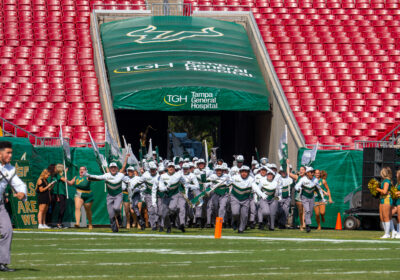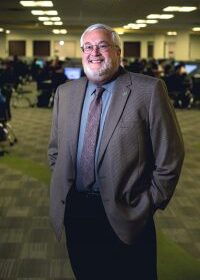USF’s Mock Trial turns classroom into courtroom
 Started as a small club of about six students in 2008, the USF Mock Trial team has blossomed into two competing teams totaling 20 students, and has even gone against the likes of Harvard.
Started as a small club of about six students in 2008, the USF Mock Trial team has blossomed into two competing teams totaling 20 students, and has even gone against the likes of Harvard.
The team began as a way for pre-law students to gain and exercise courtroom-based skills as undergraduates. The team, which regularly practices and holds scrimmages against mock trial organizations from other institutions, has seen a great deal of success its seven short years at USF.
“The purpose is to give students that are interested in the pre-law track an opportunity to get real courtroom experience using real courtroom procedures, rules of evidence, real objections, and the best part about it is when we compete against other universities, we get judged by real attorneys and real judges,” said Sammy Hamed, president of the USF Mock Trial team and a junior majoring in political science. “The feedback is really relevant for us and helps us grow.”
Hamed, who was part of his high school’s mock trial team, came to USF as a freshman with the intent to continue on to law school after graduation. Because of his interest in law, he looked for organizations that would allow him to gain experience and knowledge before law school; thus: Mock Trial.
“It helped me grow as a leader on campus and get involved in Student Government,” he said. “I wouldn’t have been in Student Government if I didn’t join Mock Trial, I don’t think.”
Participation in the club helps to build students’ public speaking and critical thinking skills while sharpening their ability to think on their feet, a critical skill for any lawyer.
While the club primarily attracts pre-law students, Hamed said the club is inclusive of all majors and there are opportunities for everyone involved to gain experience related to their areas of study.
“We have English majors, we have engineering students because they can play different types of expert witnesses …” Hamed said. “That gives even theater students an opportunity to grow some skills.”
The team’s win at a recent tournament in Pensacola was one of many that earned them a spot in the upcoming regional tournament, described as “the playoffs” of mock trials, hosted by the University of Central Florida in Orlando.
In the recent tournament, the USF Mock Trial team beat out schools such as Auburn, the University of Florida and the University of Alabama for the first time.
While the team missed the chance to move on by a mere five points last year, they hope to win and continue on to the Opening Round Championships.
Each year, the team takes on and prepares a case with three attorneys and three witnesses from both sides. The team has an attorney coach this year, who helps them practice arguing their case before scrimmages and tournaments.
Every tournament is modeled after a real life courtroom environment and consists of four rounds, each three hours long, which typically span the course of two days. Each competing team direct-examines their witnesses and cross-examines the other teams witnesses.
The judging panel, which consists of volunteer attorneys, judges and law students, uses a ballot system to score each team’s competence in direct- and cross-examinations and compares scores to determine a winner among teams.
Because of the real-world nature of the mock trial tournaments, students who participate walk away with knowledge that they utilize throughout the duration of their studies.
“Everyone that graduates from USF Mock Trial and goes to law school will come back and tell the team how much it really helped them and put them ahead in terms of evidentiary classes, public-speaking wise, critical thinking skills,” Hamed said. “It really just develops skills that you’ll see in law school, even if you don’t do criminal or civil law.”






